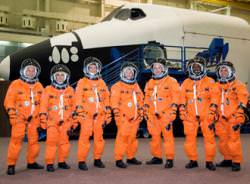A problem with space shuttle Atlantis’ fuel sensors has prompted a scrub of today’s scheduled launch of the STS-122 mission to the International Space Station. During fueling of the shuttle’s external tank, two of four engine cutoff sensors failed. Engineers are working on fixing the problem and NASA will try to launch again tomorrow, Friday, December 7 at 4:09 pm EST.
Sensors located in the hydrogen portion of the tank "failed wet" during fuel loading this morning. That means the sensors could falsely indicate the tank still contains hydrogen in the last stages of the shuttle’s climb to space when it actually is empty. The engines would continue to run, and without fuel, the engines could ignite and explode.
Problems with the engine cutoff sensors have occurred before during tanking, including the first shuttle mission after the Columbia accident, STS-114 with space shuttle Discovery. The failed sensors caused a one-day delay in the launch and after the flight the problem was traced to a faulty connection in electrical cables. NASA hopes that in emptying the tank and then refueling tomorrow the sensors will reset correctly, as was the case with the STS-114 launch.
This shuttle mission, STS-122, will bring the Columbus science module to the ISS. Columbus is the European Space Agency’s cornerstone contribution to the space station. Two ESA astronauts, Hans Schlegel from Germany, and Leopold Eyharts from France, are part of the shuttle crew, and Eyharts will remain on board the station to lead the activation of the new lab. The other astronauts for the mission are Commander Stephen Frick, pilot Alan Poindexter and mission specialists Rex Walheim, Stanley Love, and Leland Melvin.
STS-122 is expected to be an 11 day mission. It is the 121st shuttle flight and the 24th mission to the ISS.
Original News Source: NASA TV
 Universe Today
Universe Today
